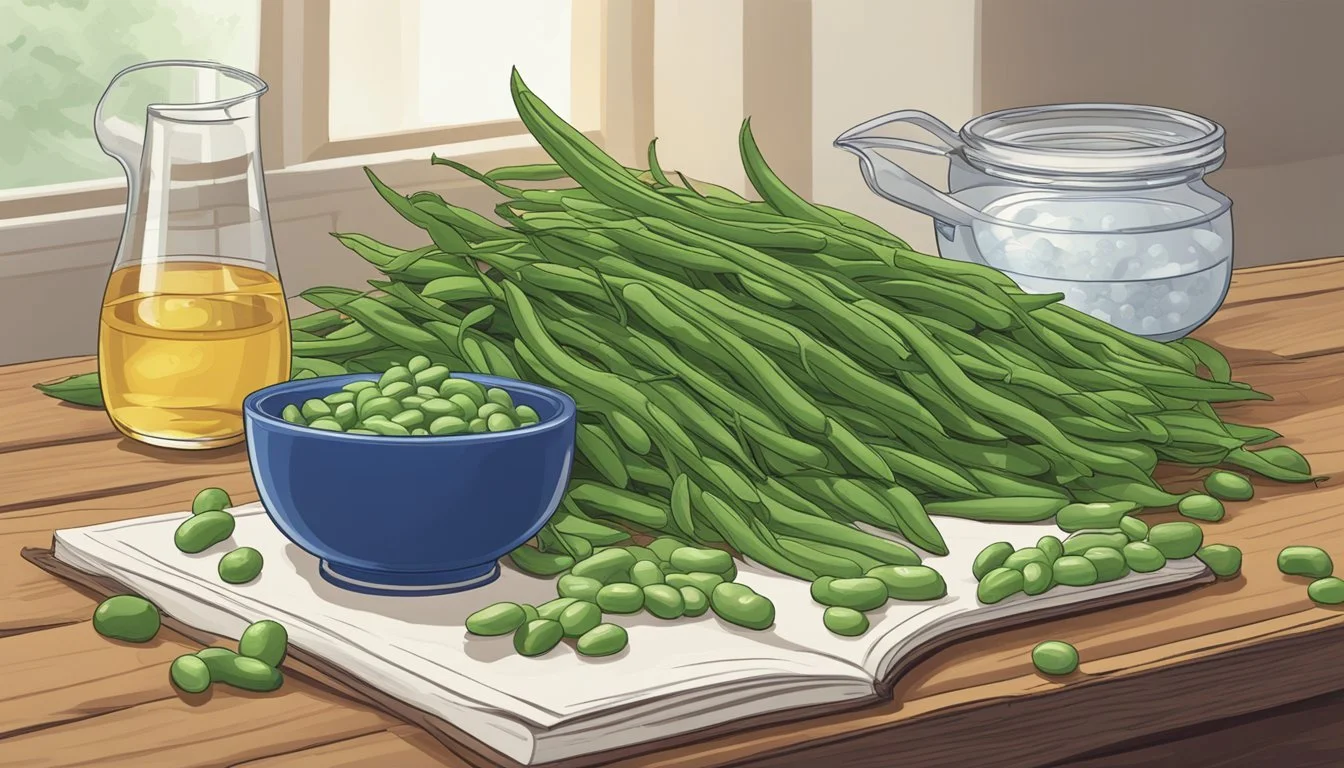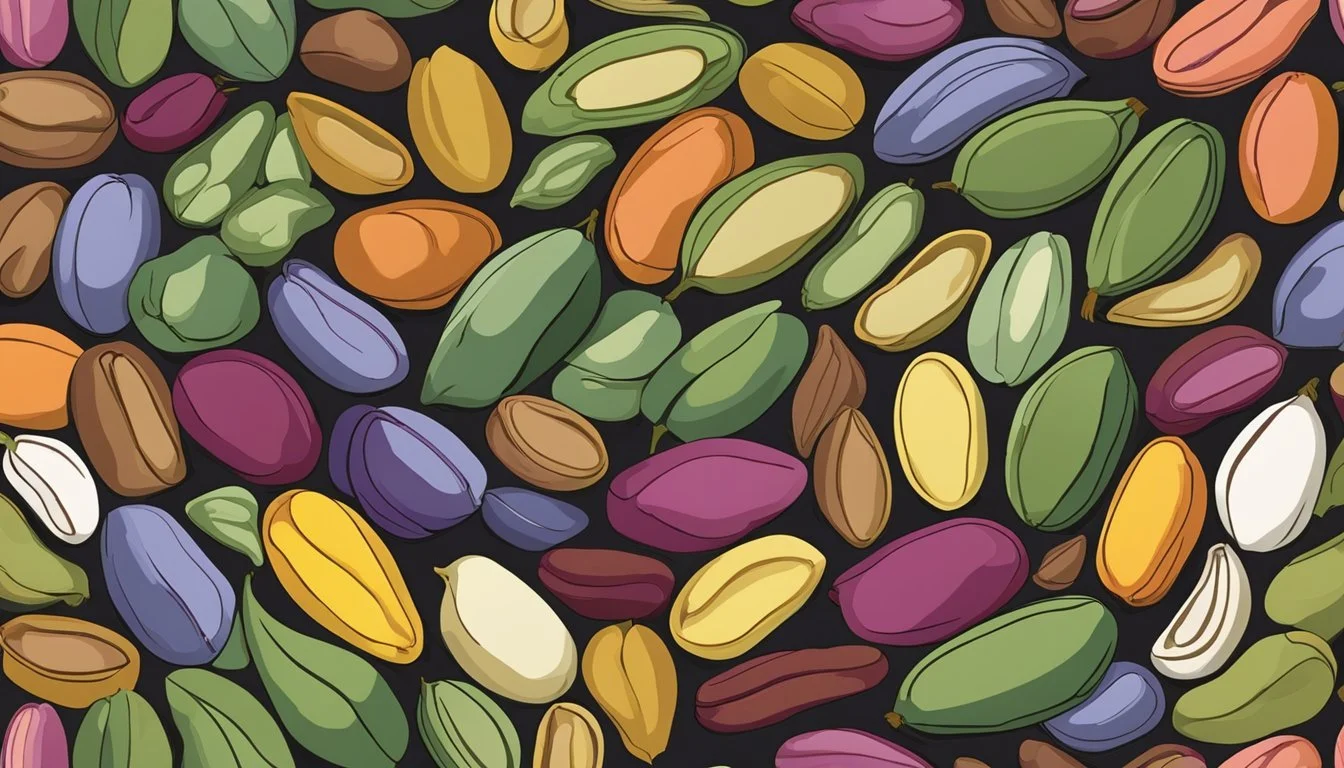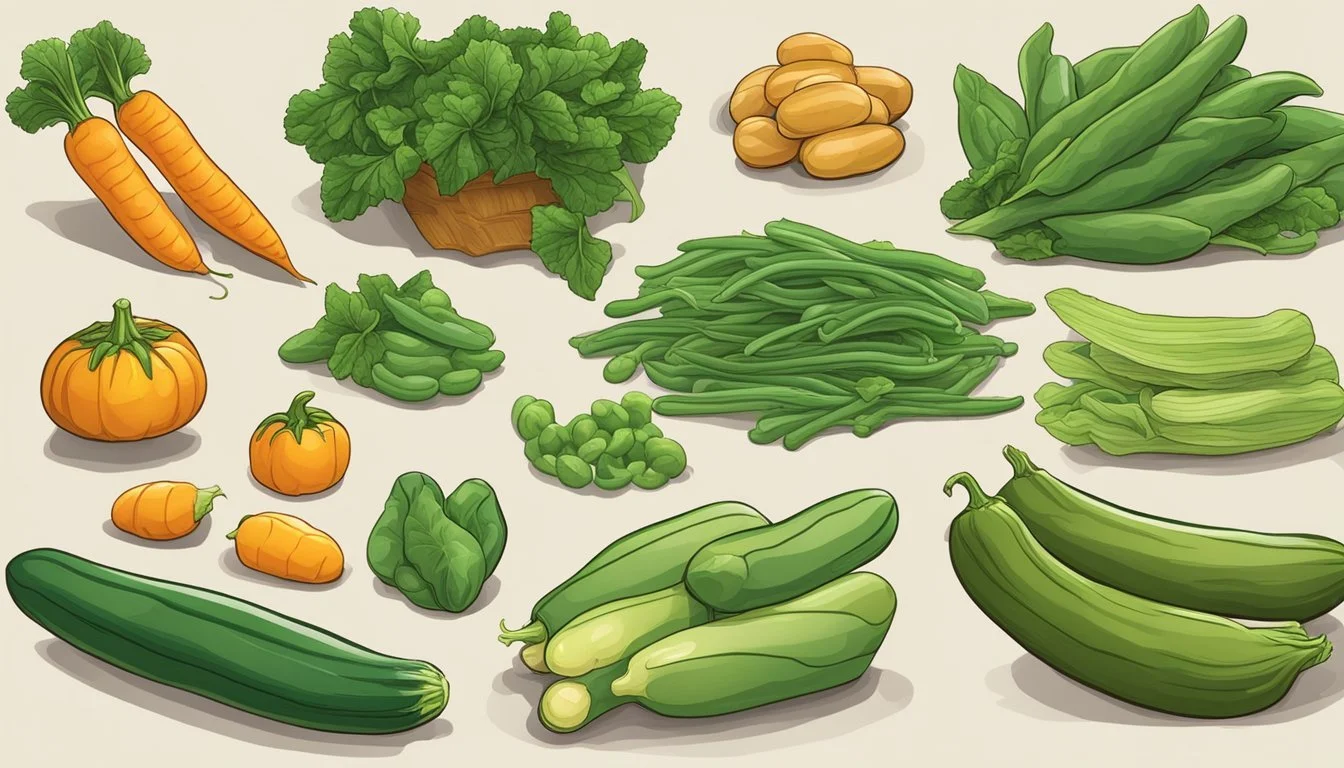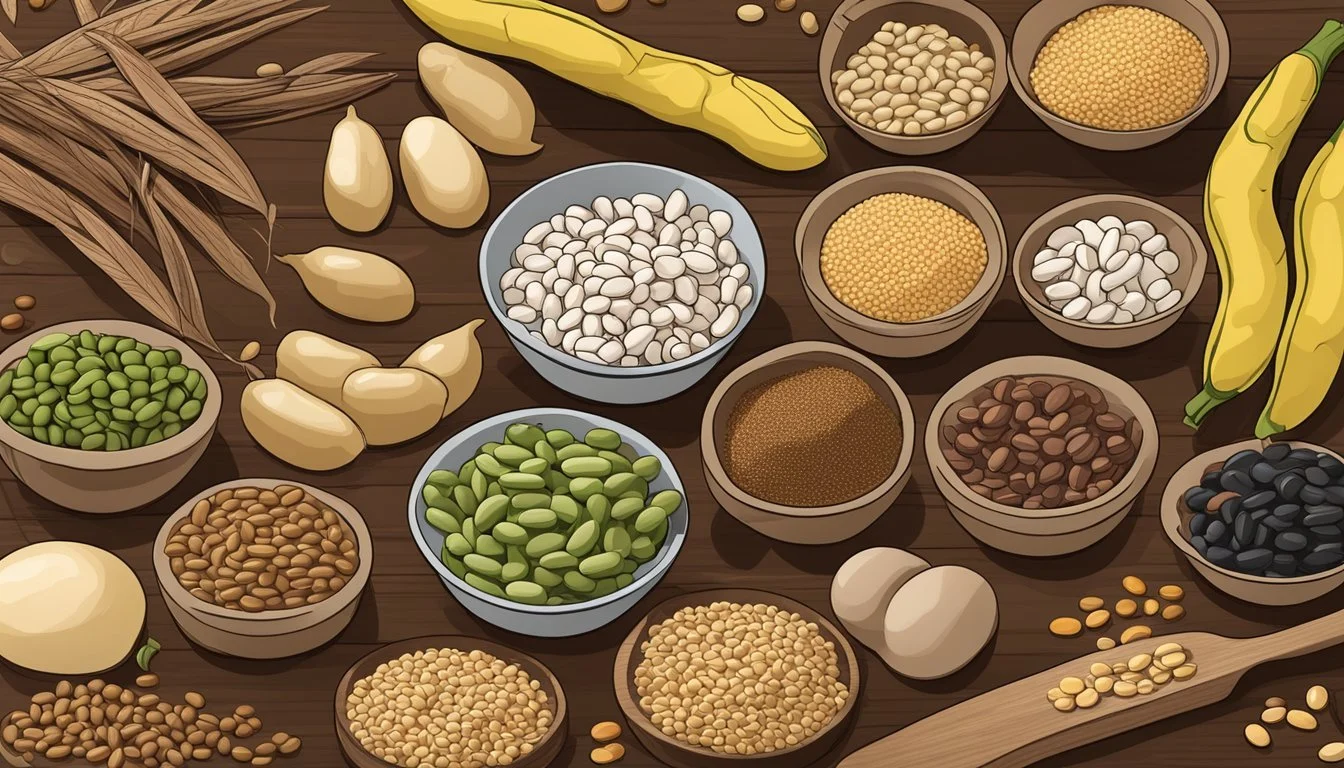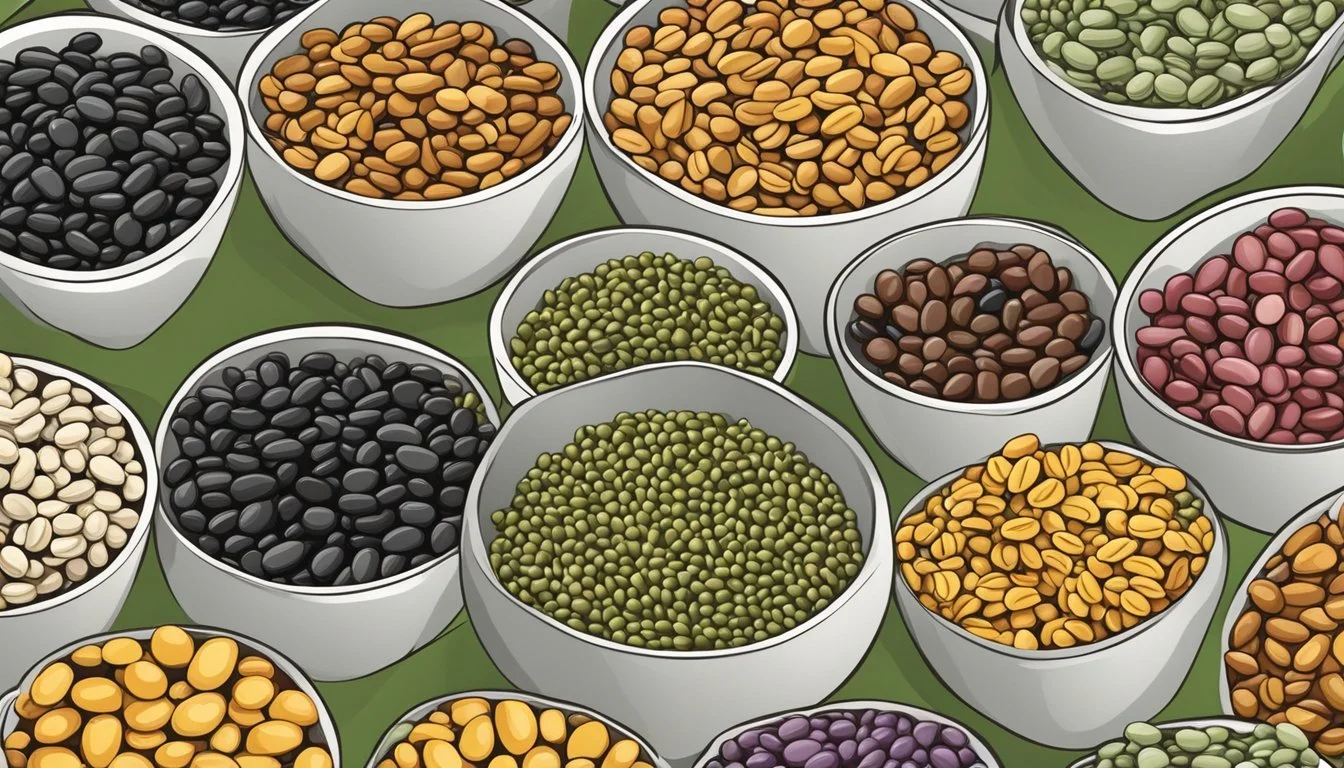Jack Beans Substitutes
Top Alternatives for Your Recipes
Looking for a substitute for Jack beans in your recipes? Whether you're exploring vegan or plant-based protein options, there are several alternatives that can provide the same nutritional benefits. A great substitute for Jack beans is black beans, known for their versatility and high protein content, making them suitable for a wide range of dishes.
Chickpeas also serve as an excellent replacement. Their subtle flavor and hearty texture can seamlessly blend into salads, soups, and even stews. Additionally, lentils, which cook faster and adapt well to various recipes, provide another practical option for those looking to replace Jack beans.
For those interested in more exotic flavors, mung beans and adzuki beans can offer unique tastes and textures. Both are packed with protein and can be incorporated into a variety of preparatory methods, from sprouting to boiling. These substitutes ensure that your meals remain nutrient-rich and flavorful.
Understanding Jack Beans
Jack beans are a versatile legume, known for their nutritional benefits and culinary applications. They offer a high fiber content, making them a healthy addition to various recipes, including soups, stews, and salads.
Nutritional Profile
Jack beans are rich in dietary fiber, aiding digestion and promoting gut health. Each serving provides significant amounts of protein, which is beneficial for muscle growth and repair. They also contain essential vitamins and minerals, such as B-vitamins, iron, magnesium, and potassium.
The fiber in jack beans helps regulate blood sugar levels and supports weight management. Their low-fat content makes them an excellent choice for those on a vegan or plant-based diet. Additionally, the high protein content makes them a valuable alternative to animal-based proteins.
Culinary Uses
Jack beans are adaptable and can be used in various recipes. Their creamy texture is ideal for incorporating into soups and stews, adding both flavor and nutritional value. They can be marinated and used in salads for an added protein boost.
For stews, cook jack beans until tender and mix with vegetables for a hearty, nutritious meal. In soups, they provide a thick, creamy consistency. Salads benefit from the addition of jack beans by enhancing the overall protein content and providing a satisfying texture.
Integrating jack beans into a variety of vegan and vegetarian dishes enriches meals with essential nutrients while offering a unique flavor.
Popular Bean Varieties and Their Characteristics
Various bean varieties offer unique flavors, textures, and nutritional benefits. Understanding these qualities can help in choosing the right beans for different culinary applications.
Pinto Beans
Pinto beans are a staple in Mexican cuisine. Their creamy texture and earthy flavor make them ideal for dishes like refried beans and chili con carne. These legumes are high in protein and fiber, beneficial for a balanced diet.
Key Nutritional Values:
Protein: 15g per cup
Fiber: 15g per cup
Culinary Uses:
Refried Beans
Stews
Soups
Pinto beans are also a good source of iron, magnesium, and folate.
Kidney Beans
Kidney beans, especially the red variety, are commonly used in chili. Their meaty texture withstands long cooking times, making them perfect for soups and stews. These legumes are rich in protein, fiber, and essential minerals.
Nutritional Highlights:
Protein: 13g per cup
Fiber: 11g per cup
Iron: 20% of daily value
Popular Dishes:
Chili con Carne
Salads
Kidney beans are versatile and can be used in various dishes beyond chili, such as red beans and rice.
Black Beans
Black beans, or black turtle beans, are frequently used in Latin American dishes. They have a creamy texture and a slightly sweet flavor, making them a versatile ingredient.
Nutritional Profile:
Protein: 15g per cup
Fiber: 15g per cup
Antioxidants: High in anthocyanins
Culinary Applications:
Burritos
Salads
Stews
They are commonly used as substitutes for other beans in recipes that call for a rich flavor.
Navy and Great Northern Beans
Navy beans and Great Northern beans are types of white beans. Both are commonly used in soups and stews due to their mild flavor and smooth texture.
Nutritional Information:
Protein: 15g per cup
Fiber: 19g per cup
Culinary Uses:
Navy Bean Soup
Casseroles
Chili
Great Northern beans are slightly larger and absorb flavors well, making them ideal for hearty dishes.
Chickpeas and Hummus
Chickpeas, also known as garbanzo beans, are a cornerstone of Mediterranean dishes. They have a nutty flavor and firm texture. Chickpeas are the main ingredient in hummus, a popular Middle Eastern spread made with tahini.
Nutritional Highlights:
Protein: 14g per cup
Fiber: 12g per cup
High in folate and manganese
Common Uses:
Hummus
Salads
Roasted Snacks
Chickpeas can also be used in soups, curries, and as a protein-rich substitute for meat in various recipes.
Vegetarian and Vegan Substitutes for Jack Beans
Jack beans can be replaced in various dishes by a range of other plant-based protein sources. These alternatives not only mimic the texture and flavor but also offer nutritional benefits that enrich vegetarian and vegan diets.
Lentils and Their Versatility
Lentils come in several varieties, including green, brown, and red, making them a diverse substitute for jack beans. They cook relatively quickly and absorb seasonings well.
Lentils are high in fiber and protein, essential for vegetarian and vegan diets. They work excellently in soups, stews, and salads where jack beans would traditionally be used. Their slightly earthy flavor blends well with a wide array of spices and herbs. Red lentils make particularly good substitutes in recipes requiring a softer texture.
Chickpeas as a Stand-in
Chickpeas, also known as garbanzo beans, are another great alternative to jack beans. They are rich in protein and fiber and provide a mild, nutty flavor that suits many dishes.
Chickpeas are especially popular in Mediterranean and Middle Eastern cuisines, often featured in hummus, soups, and salads. They can be roasted for a crunchy snack or mashed as a base for vegetarian patties. When cooked, chickpeas retain a firm texture similar to jack beans, making them suitable for a variety of culinary applications.
Peas and Their Unique Flavor
Peas, including green peas and split peas, offer a unique flavor profile and are suitable substitutes for jack beans. They are packed with vitamins, minerals, and antioxidants, contributing vital nutrients to a vegan or vegetarian diet.
Split peas, commonly used in soups and stews, break down to create a creamy consistency, ideal for thick soups. Green peas can be added to salads, stir-fries, or served as a side dish. Their sweet flavor and bright color enhance the visual appeal and taste of many recipes.
Edamame and Soybeans
Edamame, the young soybeans, are an excellent replacement for jack beans, especially in Asian cuisine. They are high in protein, fiber, and essential amino acids, making them a nutritional powerhouse for vegan diets.
Edamame can be sautéed, boiled, or steamed and used in a variety of dishes, from salads to soups. Regular soybeans, which are mature edamame, can be used similarly and are often added to stews, casseroles, and grain bowls. The firm texture of soybeans holds up well in cooking, akin to the functionality of jack beans.
Grains and Seeds as Bean Alternatives
Grains and seeds offer a versatile range of health benefits and culinary uses, making them ideal substitutes for jack beans in various dishes. These alternatives provide fiber, protein, and other essential nutrients while catering to different dietary needs, such as vegan and gluten-free diets.
Quinoa: A Complete Protein
Quinoa is a highly nutritious grain that serves as an excellent substitute for beans. It is considered a complete protein, meaning it contains all nine essential amino acids.
Quinoa is also rich in fiber, with around 5 grams per cup, making it beneficial for gut health. Its versatile texture adds a nutty flavor to salads and side dishes.
Rice Varieties
Rice is a staple in many diets and can replace beans in numerous recipes. Varieties like brown rice and wild rice offer higher fiber content compared to white rice, contributing to better digestive health.
Cauliflower rice is a low-carb option that mimics the texture of rice, perfect for those following a keto diet. Rice integrates well into salads, stews, and casseroles, providing a subtle flavor without overpowering other ingredients.
Nuts and Seeds
Nuts and seeds such as walnuts, cashews, and sunflower seeds can also be used as bean alternatives. They offer a good source of protein and healthy fats, enhancing the nutritional profile of dishes.
Sprinkling sunflower seeds on salads or incorporating cashews into stir-fries boosts the protein content while adding a satisfying crunch. These options are particularly beneficial for vegan and gluten-free diets.
Sorghum as an Alternative
Sorghum is a gluten-free grain that acts as a fantastic substitute for beans, especially in dishes where beans are kept whole. Sorghum boasts a high fiber content and provides several essential nutrients, including antioxidants.
Its chewy texture and mild flavor make it a versatile ingredient in both savory and sweet recipes. Sorghum can be added to stews, soups, or served as a side dish to complement various meals.
Non-Bean Vegetable Substitutes
When considering alternatives to Jack beans, mushrooms and cauliflower present themselves as standout choices. Each brings unique textures and flavors, making them suitable for a variety of dishes.
Mushrooms: Meaty Texture
Mushrooms, particularly portobello mushrooms, offer a rich, umami flavor and a robust, meaty texture. This makes them a popular choice among vegetarians and vegans looking to add depth to their meals.
Portobello mushrooms can be grilled, roasted, or sautéed, fitting seamlessly into stir-fries and stews. The texture holds up well in various cooking methods, ensuring a hearty bite.
They work exceptionally well in dishes where beans provide substance, such as casseroles or as a filling in tacos.
Cauliflower: A Versatile Choice
Cauliflower stands out for its versatility. It can be transformed into cauliflower rice, mashed, or even used in stir-fries. This cruciferous vegetable easily absorbs flavors from seasonings and sauces.
A single cup of cauliflower provides a low-calorie, nutrient-dense substitute for beans. It works well in recipes that call for a bulkier ingredient. When roasted, it gives a slightly nutty flavor, adding another layer of complexity to dishes.
Cauliflower is an excellent choice for those looking to maintain a light and healthy diet while still enjoying flavorful meals.
Protein-Packed Alternatives
Tofu and tempeh are two highly protein-rich alternatives to jack beans. These options are well-known in vegan and Asian cuisine, delivering substantial nutritional benefits.
Tofu and Tempeh
Tofu, made from soybeans, is a staple in Asian cuisine. It contains approximately 10 grams of protein per half-cup serving. It's versatile and can be used in a variety of dishes such as stir-fries, soups, and even desserts.
Tempeh has a firmer texture and a higher protein content than tofu, offering around 21 grams per half-cup serving. Fermented from soybeans, tempeh also provides probiotics, which are beneficial for gut health, making it another excellent alternative in vegan diets.
Culinary Applications
Utilizing Jack bean substitutes can transform a wide array of dishes, from hearty soups and stews to refreshing salads and robust vegetarian chili. Whether aiming to replicate the texture or flavor profile, alternatives can fit seamlessly into various recipes.
Bean Substitutes In Soups and Stews
Kidney beans and great northern beans are popular replacements for Jack beans in soups and stews. These beans maintain their shape well during cooking, ensuring a robust texture that stands up to prolonged simmering. Navy beans offer a softer texture but excel in creamy soups, enhancing viscosity without overpowering other flavors.
In vegetable-based broths, lima beans can provide a similar earthy taste to Jack beans. Their starchy composition also helps thicken the broth. For a touch of sweetness, pinto beans can be added, complementing dishes such as minestrone or hearty beef stew.
Salads with Bean Alternatives
For cold salads, chickpeas and black beans are excellent substitutes. Chickpeas offer a firm texture and mild flavor, making them suitable for Mediterranean-inspired salads. Black beans bring a slight sweetness and are perfect for Southwestern-style salads.
Cannellini beans can mimic the creamy texture of Jack beans, making them ideal for Italian pasta salads. Butter beans, noted for their rich, buttery flavor, enhance bean and vegetable salads, adding depth without overwhelming other ingredients.
Edamame can also serve well in Asian salads, providing a unique twist while maintaining nutritional balance.
Vegetarian Chili Options
When creating vegetarian chili, black-eyed peas and red beans are excellent Jack bean substitutes. They absorb seasonings well and provide a hearty texture. Adzuki beans can be used for a slightly nutty flavor, balancing the spiciness of the chili.
Lentils are another versatile option, cooking quickly and adding a different texture to the dish. These beans blend well with tomatoes, peppers, and spices, enriching the chili’s flavor profile.
To boost protein content, quinoa can be added alongside these bean substitutes, offering a complete and satisfying meal.
Nutritional Considerations
Jack beans, like other legumes, offer several nutritional benefits. They are rich in plant-based protein, making them an excellent substitute for animal proteins. This can be particularly beneficial for those following vegetarian or vegan diets.
One of the key advantages of jack beans is their high fiber content. Consuming fiber can aid in digestion, help maintain healthy blood sugar levels, and contribute to a feeling of fullness.
Nutrient Amount per 100g Protein 8.7g Fiber 12g Iron 2.1mg Calcium 77mg
Jack beans are also a good source of essential vitamins and minerals, including iron and calcium. Iron is crucial for maintaining healthy blood cells, while calcium supports bone health.
Including jack beans in your diet can help meet daily protein and fiber requirements. They can be used in a variety of dishes, from stews to salads, ensuring versatility in meal planning.
When considering substitutes for jack beans, options like lentils, quinoa, and other beans can also provide similar nutritional benefits. Each of these alternatives offers its own unique profile while supplying adequate protein and fiber.
Incorporate jack beans or their substitutes into meals to enjoy their numerous health benefits, promoting a balanced and nutritious diet.


